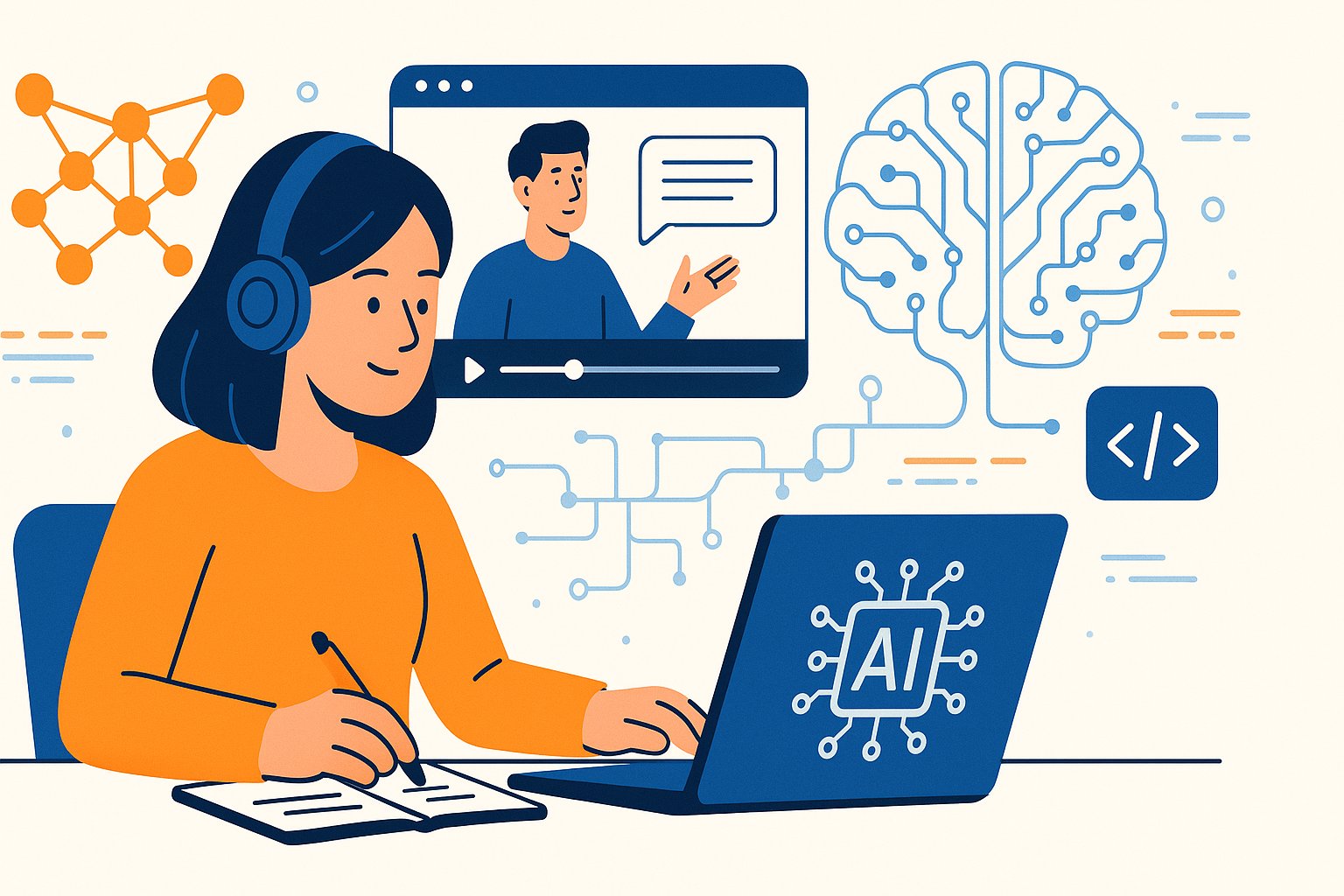18 Top AI Courses for Healthcare professionals in 2025
Discover cutting-edge AI courses designed for healthcare professionals in 2025. Enhance your skills with expert-led programs that cover data analysis, machine learning, and AI-driven patient care solutions. Stay ahead in the evolving medical landscape!
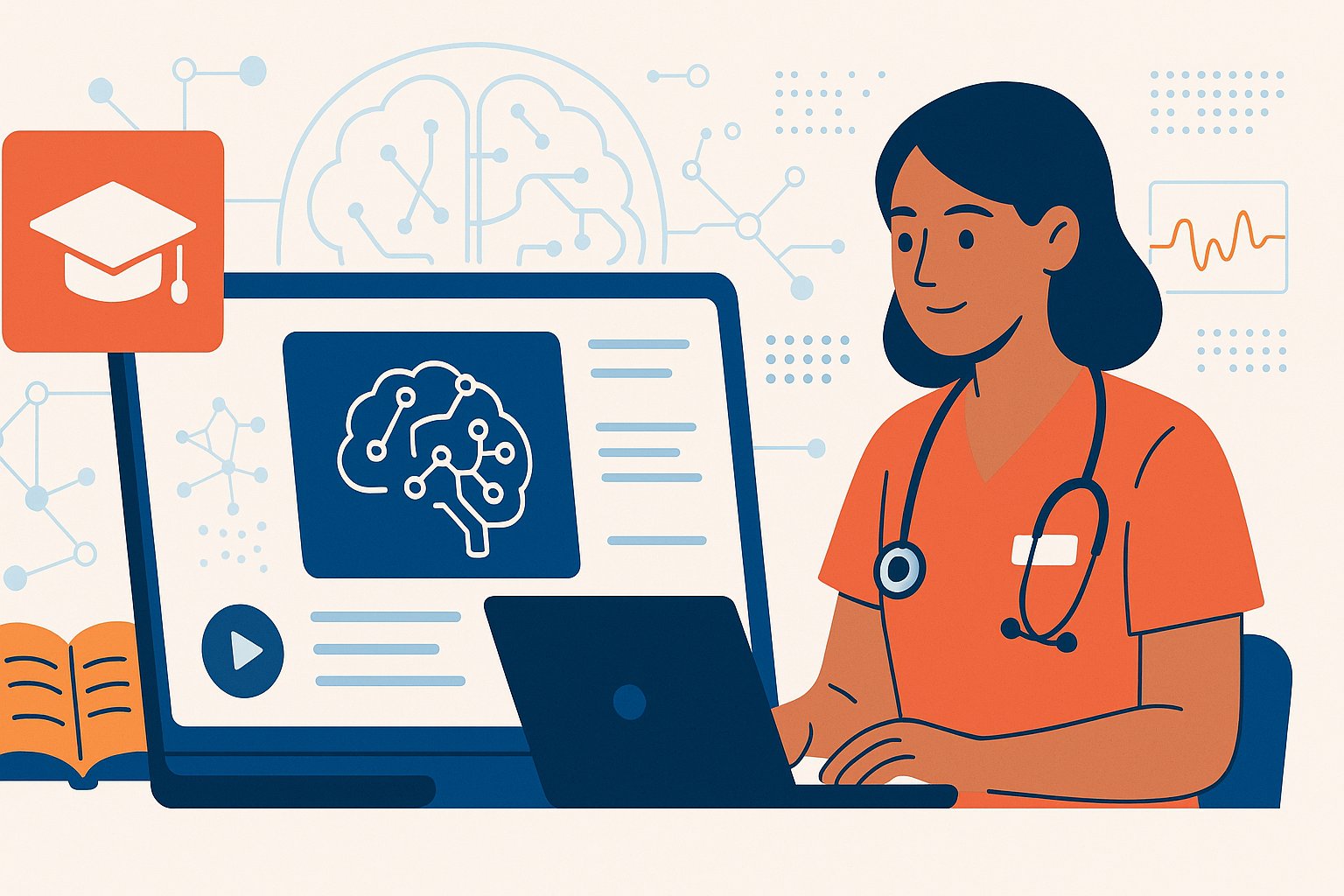
The rapid integration of Artificial Intelligence (AI) in various sectors underscores the urgency for professionals to enhance their skills and stay relevant. In healthcare, AI's transformative potential is undeniable, offering unprecedented advancements in patient care, diagnostics, and operational efficiency. As AI technologies continue to develop, healthcare professionals face the dual challenge of upskilling to leverage these tools effectively and adapting to new roles that AI is creating within the industry. This article explores a selection of AI courses tailored for healthcare professionals, aiming to equip them with the knowledge needed to thrive in an AI-driven landscape.
Why AI matters for Healthcare professionals today
AI's relevance in healthcare is growing exponentially, with an increasing number of businesses embracing AI solutions to enhance their operations. According to recent statistics, approximately 69% of businesses are already utilizing AI in various capacities, highlighting the significant momentum behind AI adoption. For healthcare professionals, understanding and applying AI is crucial for enhancing patient outcomes, improving operational processes, and maintaining a competitive edge. This article serves as a guide to identifying the most suitable AI courses that can empower healthcare professionals to effectively integrate AI into their practices, ensuring they remain at the forefront of medical innovation.
The Growing Role of AI in Healthcare professionals
AI applications in healthcare are diverse and impactful. From automating administrative tasks to supporting clinical decision-making and personalizing patient care, AI is reshaping the way healthcare professionals work. AI-driven automation helps streamline routine tasks, allowing professionals to focus more on patient care. In decision-making, AI provides data-driven insights that enhance diagnostic accuracy and treatment plans. Moreover, AI's ability to analyze vast datasets enables personalized healthcare solutions, tailoring treatments to individual patient needs. These applications demonstrate AI's capacity to optimize workflows and improve efficiency in healthcare settings.
Benefits of becoming an AI expert in Healthcare professionals
Gaining expertise in AI offers numerous benefits for healthcare professionals. First, it enhances their ability to deliver superior patient care by leveraging AI's predictive and analytical capabilities. AI proficiency also increases career opportunities, as healthcare institutions seek skilled professionals who can integrate AI into their operations. Additionally, understanding AI tools can lead to more efficient management of healthcare resources and improved patient satisfaction. By becoming adept in AI applications, healthcare professionals can play a crucial role in driving innovation within their organizations and contributing to the broader healthcare ecosystem.
This article reviews 18 AI courses designed for healthcare professionals, including the comprehensive offerings of CompleteAI Training. Our analysis aims to provide valuable insights into each course's unique features, helping professionals make informed decisions about their AI education and career development.

Comparison: All AI Courses for Healthcare professionals (Updated Q2' 2025)
| Course Name | Provider | Price | Key Topics | Pros | Cons | Best For |
|---|---|---|---|---|---|---|
| AI for Healthcare professionals (Video Courses + Certifications) | CompleteAI Training | $29/month or $8.25/month billed annually | Video courses, Certifications, AI tools, AI industry news | Highest rating, Extensive AI courses, Daily updates, Affordable pricing | Subscription based | Healthcare professionals |
| Demystifying AI in Healthcare (2025) | United in Diversity (UID) | $1,000 | AI and data analytics, Clinical and public health settings | Expert instruction, Practical training, Certification from UBC | Limited seats, In-person attendance required | General learners |
| AI for Medical Professionals , June 2025 | IIIT Hyderabad | $360 (faculty/medical professionals), $180 (postgraduate students) | AI and ML in clinical settings, Ethical and governance issues | Comprehensive education, Hands-on experience, Recognized certification | Admission closed for June batch | General learners |
| Introduction to Generative AI in Healthcare | Coursera Instructor Network | $59/month | Generative AI applications, Data ethics, Regulatory compliance | Comprehensive coverage, Focus on ethics and compliance | Not specified | General learners |
| Trustworthy AI for Healthcare Management | Politecnico di Milano | $59/month | Trustworthy AI, Data ethics, Healthcare regulations | High rating, Strong focus on ethics | Not specified | General learners |
| Introduction to Using Generative AI in Public Health | Johns Hopkins University | $59/month | Generative AI, Health policy, Disease prevention | Short duration, Practical focus | Mixed level may require prior knowledge | General learners |
| Generative AI for Healthcare Students and Professionals | University of Glasgow | $59/month | Data ethics, Predictive modeling, Deep learning | High rating, Broad coverage | Limited reviews | General learners |
| AI in Healthcare Capstone | Stanford University | $59/month | Machine learning, AI deployment, Data ethics | Capstone project, Practical focus | Mixed level may be challenging | General learners |
| Stanford AI in Healthcare Specialization | Stanford University | $400 (estimated) | Predictive analytics, Clinical ML, Hands-on projects | Cutting-edge curriculum, Hands-on projects | Premium pricing | General learners |
| AI in Health Care: From Strategies to Implementation | Harvard University | $400 (estimated) | Strategic frameworks, Precision medicine, Leadership | Focus on leadership, Operational efficiency | Premium pricing | General learners |
| Artificial Intelligence in Healthcare: Fundamentals and Applications | MIT | $400 (estimated) | AI decision frameworks, Healthcare simulations, Responsible AI | Innovative curriculum, Emphasis on responsibility | Premium pricing | General learners |
| Artificial Intelligence AI in Healthcare Free Course | Oxford University | Free | AI healthcare tools, Ethical frameworks, European perspective | Free, Hands-on practice | Not specified | General learners |
| Medmastery ChatGPT Essentials for Clinicians | Medmastery | Free | ChatGPT integration, Workflow optimization | Free, Beginner-friendly | Not specified | General learners |
| University of Illinois AI in Medicine Certificate | University of Illinois | $300 (estimated) | Machine learning, AI software deployment, CE credits | Technical skill development, CE credits | Not specified | General learners |
| Royal College of Surgeons in Ireland: AI in Medical Imaging | Royal College of Surgeons in Ireland | $300 (estimated) | AI in medical imaging, Clinical validation, Workflow integration | Specialized for imaging professionals | Not specified | General learners |
| University of Central Lancashire: Artificial Intelligence in Healthcare | University of Central Lancashire | $1,400 | AI in decision-making, Ethical frameworks, Clinical workflows | Patient-centered approach | Higher cost | General learners |
| American Academy of Family Physicians: AI in Family Medicine | American Academy of Family Physicians (AAFP) | Free | AI applications, Administrative tasks, Practice efficiency | Free, Practical implementation | Not specified | General learners |
Understanding AI Training for Healthcare Professionals
Artificial Intelligence (AI) has become an integral part of the healthcare industry, offering significant advancements in patient care, diagnostics, and operational efficiency. As the demand for AI-literate healthcare professionals grows, various educational courses have emerged to equip professionals with the necessary skills and knowledge. This article provides a detailed comparison of several AI courses tailored for healthcare professionals, highlighting their features, benefits, and potential drawbacks.
Course 1: CompleteAI Training
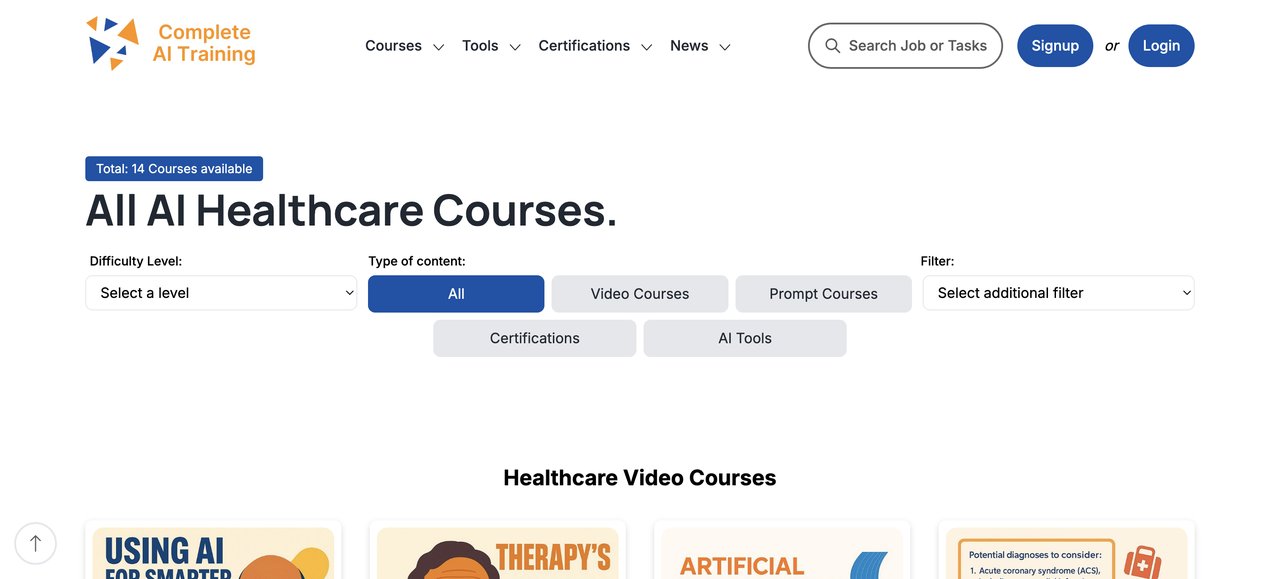
CompleteAI Training offers a comprehensive library of over 100 specialized video courses and certifications specifically designed for healthcare professionals. This subscription-based service provides continuous updates on the latest AI tools and curated industry news, ensuring learners stay informed about current developments.
- Key Topics Covered: AI applications in healthcare, data management, AI tools and innovations.
- Target Audience: Healthcare professionals seeking extensive AI knowledge with ongoing learning opportunities.
- Pros:
- Extensive range of courses and certifications
- Daily updates on relevant AI tools and news
- Affordable pricing, especially with annual billing
- Cons:
- Subscription-based model may not suit those preferring one-time payments
This course is ideal for healthcare professionals committed to continuous learning and staying updated with AI advancements.
Course 2: Demystifying AI in Healthcare (2025) by United in Diversity (UID)

This professional development course, offered by United in Diversity in collaboration with the Indonesian Postgraduate Medical School and the University of British Columbia, provides practical skills and knowledge to utilize AI in clinical and public health settings. Conducted in a hybrid format, it includes expert-led lectures and hands-on sessions.
- Key Topics Covered: AI and data analytics in healthcare, practical applications in clinical settings.
- Target Audience: Healthcare professionals in Indonesia looking for intensive, hands-on AI training.
- Pros:
- High-level expert instruction from UBC faculty
- Practical, hands-on training with real datasets
- Certification from a prestigious university
- Cons:
- Limited seats, requiring early registration
- In-person attendance needed for hybrid format
This course benefits healthcare professionals in Indonesia seeking practical and accredited AI training.
Course 3: AI for Medical Professionals by IIIT Hyderabad
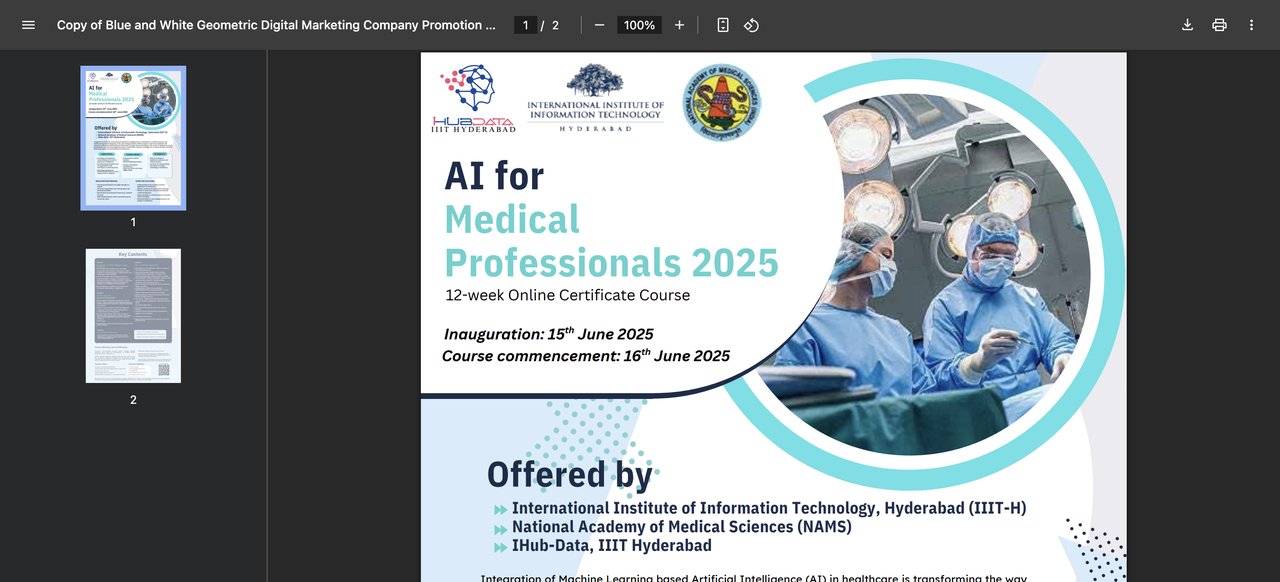
Offered by IIIT Hyderabad under the National Mission for Interdisciplinary Cyber Physical Systems, this course is designed to provide healthcare professionals with foundational and practical AI knowledge. It covers ethical considerations and governance issues, providing a comprehensive understanding of AI applications in clinical settings.
- Key Topics Covered: AI and ML applications, ethical and governance issues in healthcare.
- Target Audience: Healthcare professionals with basic healthcare knowledge seeking practical AI skills.
- Pros:
- Comprehensive and practical AI education
- Combines theoretical knowledge with hands-on experience
- Certification recognized by IIIT Hyderabad and NAMS
- Cons:
- Admission for June batch closed; registration open for November
- Requires basic knowledge of healthcare processes
This course is suitable for medical professionals wanting to gain both theoretical and practical AI insights.
Course 4: Introduction to Generative AI in Healthcare by Coursera Instructor Network
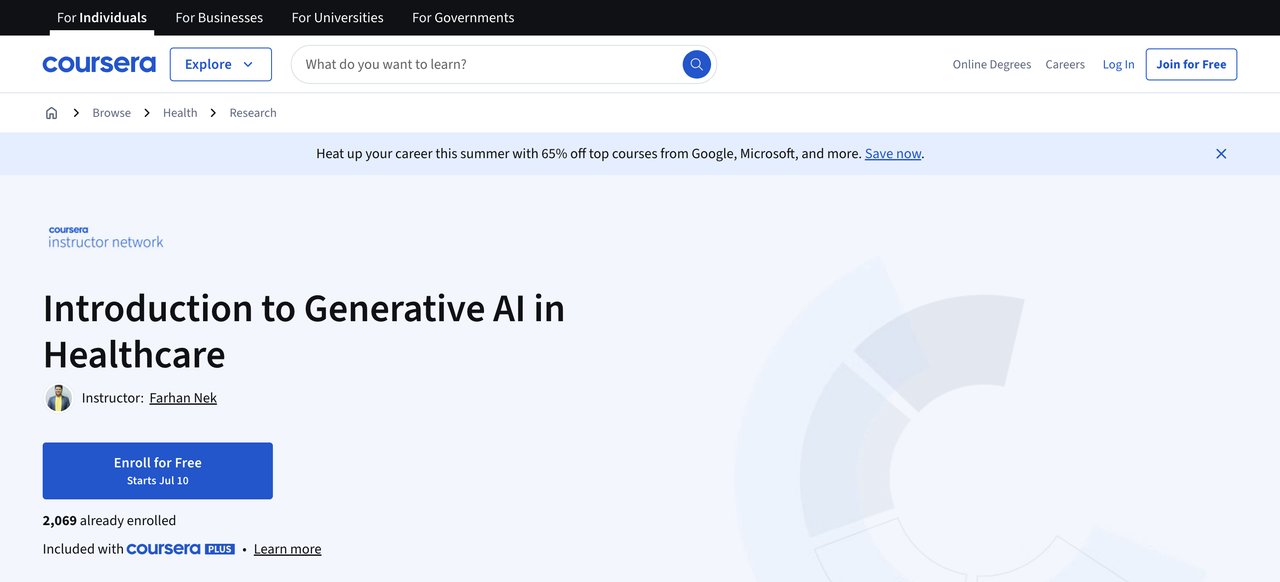
This beginner-level course explores generative AI applications within healthcare, emphasizing data ethics, regulatory compliance, and decision support systems. It provides comprehensive coverage of generative AI, ensuring learners understand both technical and ethical aspects.
- Key Topics Covered: Generative AI applications, data ethics, healthcare compliance.
- Target Audience: Beginners in healthcare interested in generative AI applications.
- Pros:
- Comprehensive coverage of generative AI in healthcare
- Focus on ethics and compliance
- Cons:
This course is perfect for beginners eager to understand generative AI's role in healthcare.
Course 5: Trustworthy AI for Healthcare Management by Politecnico di Milano
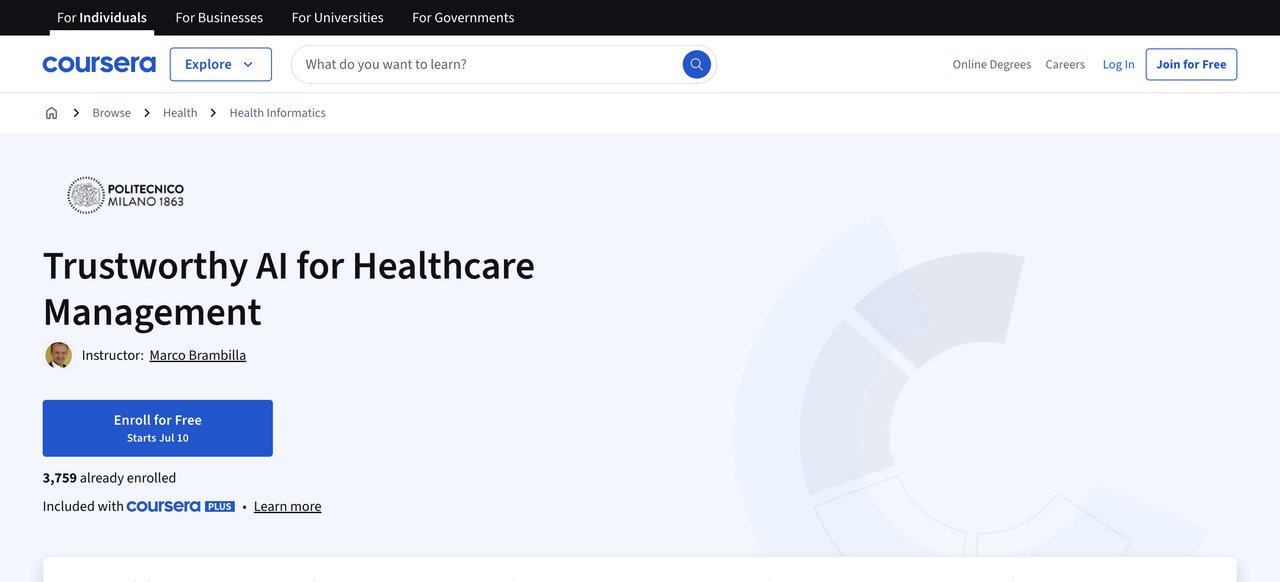
Politecnico di Milano offers a beginner course focusing on trustworthy AI in healthcare management. It covers data ethics, healthcare regulations, and verification processes, providing a solid foundation in ethical AI practices.
- Key Topics Covered: Data ethics, healthcare regulations, verification and validation.
- Target Audience: Beginners interested in the ethical aspects of AI in healthcare.
- Pros:
- High rating
- Strong focus on ethics and regulatory compliance
- Cons:
This course is ideal for those starting in healthcare management and focusing on ethical AI use.
Course 6: Introduction to Using Generative AI in Public Health by Johns Hopkins University
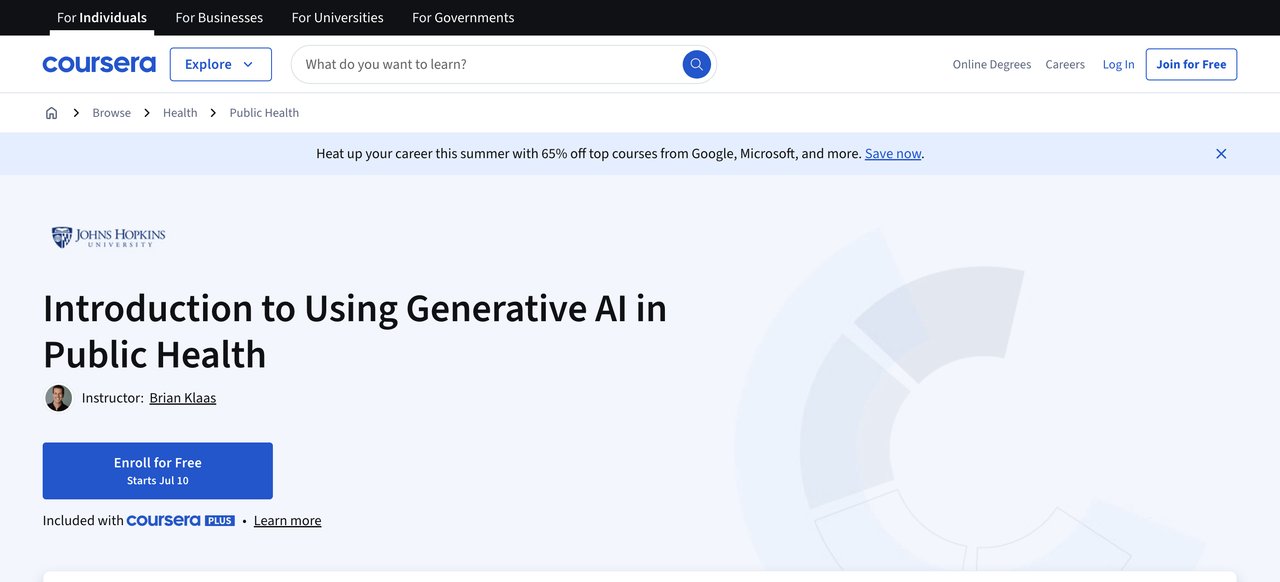
Johns Hopkins University provides a mixed-level course covering generative AI applications in public health. It emphasizes healthcare ethics, health policy, and disease prevention, offering practical insights into public health applications.
- Key Topics Covered: Generative AI applications, healthcare ethics, health policy.
- Target Audience: Public health professionals with some prior knowledge in AI.
- Pros:
- Short duration
- Practical focus on public health applications
- Cons:
- Mixed level may require some prior knowledge
This course suits public health professionals wanting practical AI insights.
Course 7: Generative AI for Healthcare Students and Professionals by University of Glasgow
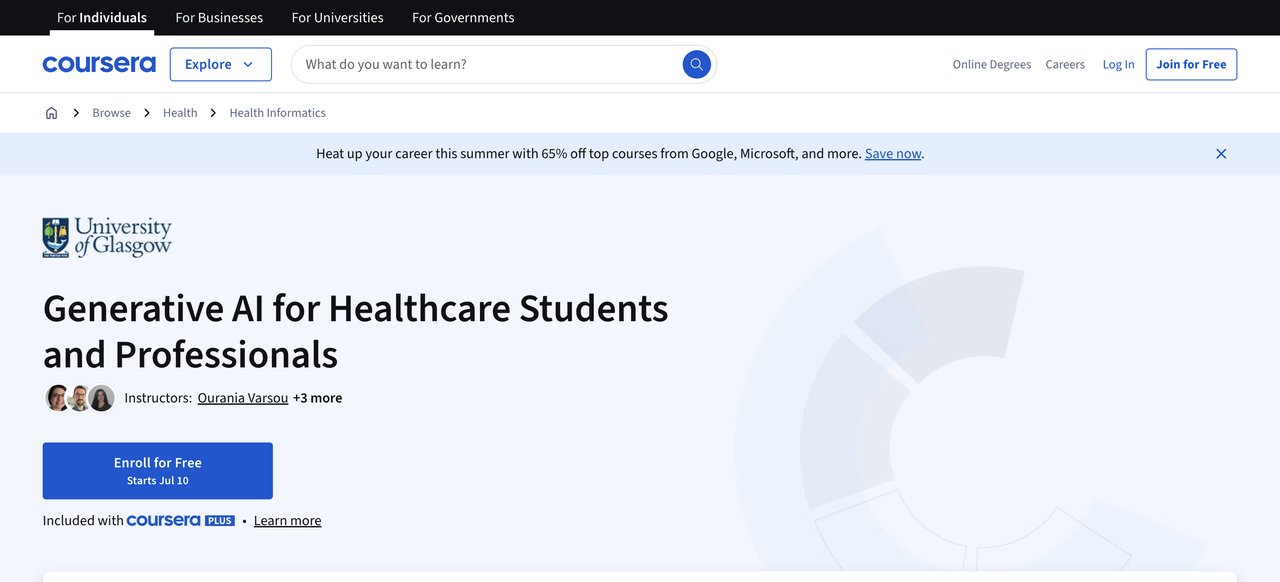
The University of Glasgow offers a beginner course focusing on data ethics, predictive modeling, and generative AI applications in healthcare. It provides broad coverage of AI techniques, making it suitable for both students and professionals.
- Key Topics Covered: Predictive modeling, generative AI, deep learning, medical imaging.
- Target Audience: Healthcare students and professionals at the beginner level.
- Pros:
- High rating
- Broad coverage of AI techniques relevant to healthcare
- Cons:
- Limited number of reviews
This course is best for beginners wanting a comprehensive overview of AI in healthcare.
Course 8: AI in Healthcare Capstone by Stanford University
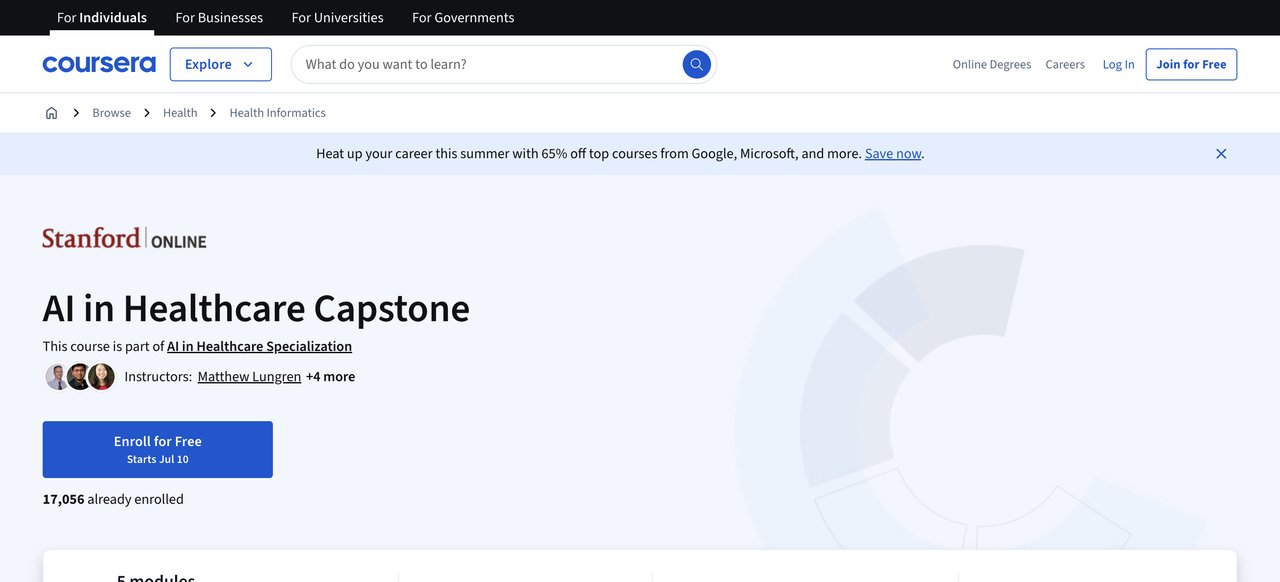
Stanford University's mixed-level capstone course focuses on applied machine learning and AI in healthcare. Learners engage in patient evaluation, data management, and AI/ML deployment projects, gaining hands-on experience in healthcare regulations and predictive modeling.
- Key Topics Covered: Machine learning, patient evaluation, data management, AI/ML deployment.
- Target Audience: Healthcare professionals with some AI background.
- Pros:
- Capstone project experience
- Practical and regulatory focus
- Cons:
- Mixed level may be challenging for beginners
This course is ideal for professionals with some AI knowledge seeking hands-on experience.
Course 9: GenAI for Healthcare Automation by Coursera Instructor Network
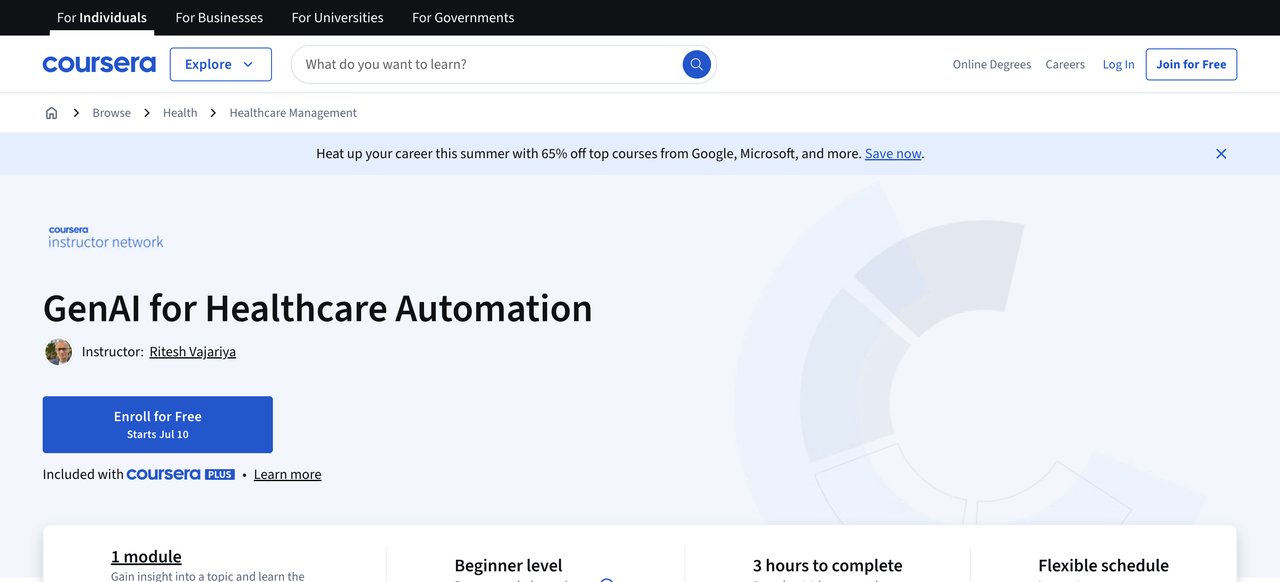
This beginner course delves into generative AI agents and automation in healthcare administration. It covers data ethics, health informatics, and predictive modeling, focusing on automation and AI agents in healthcare settings.
- Key Topics Covered: AI agents, automation, data ethics, health informatics.
- Target Audience: Beginners interested in healthcare automation.
- Pros:
- Focus on automation and AI agents in healthcare administration
- Cons:
This course suits beginners eager to explore healthcare automation using AI.
Course 10: Stanford AI in Healthcare Specialization by Stanford University
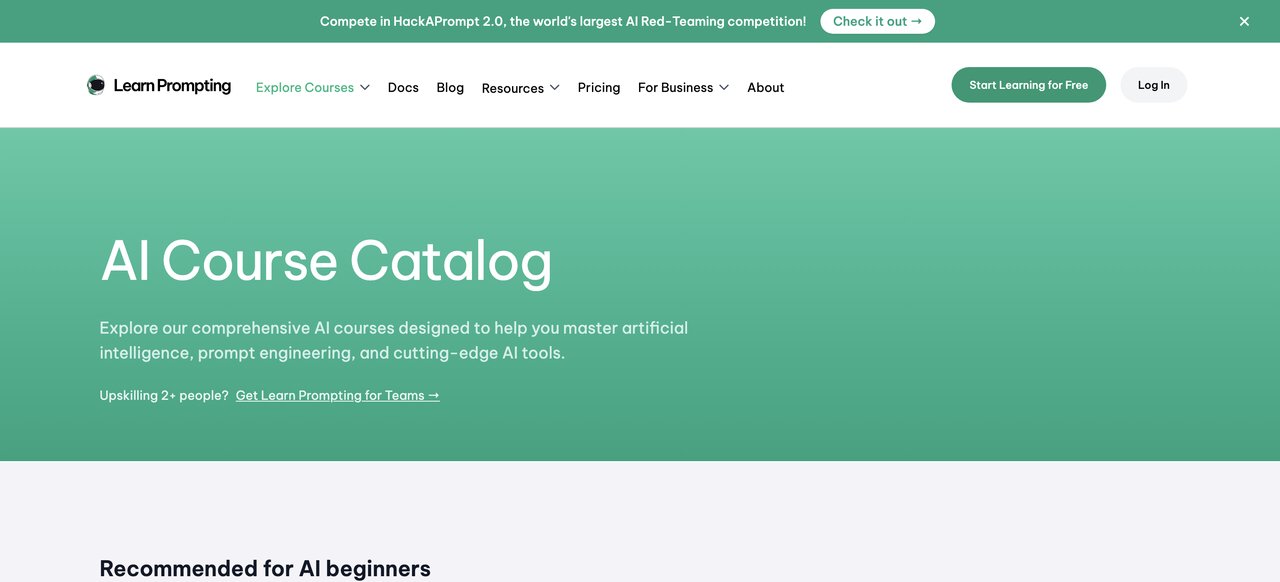
This comprehensive specialization by Stanford University offers deep academic and practical knowledge of AI in healthcare innovation. It includes predictive analytics, machine learning, and hands-on projects, taught by Stanford Medicine experts.
- Key Topics Covered: Predictive analytics, clinical machine learning, hands-on projects.
- Target Audience: Healthcare professionals seeking advanced AI knowledge.
- Pros:
- Cutting-edge curriculum
- Hands-on projects with real healthcare datasets
- Cons:
- Premium pricing
This course is best for professionals aiming for a deep dive into AI and healthcare innovation.
Course 11: AI in Health Care: From Strategies to Implementation by Harvard University
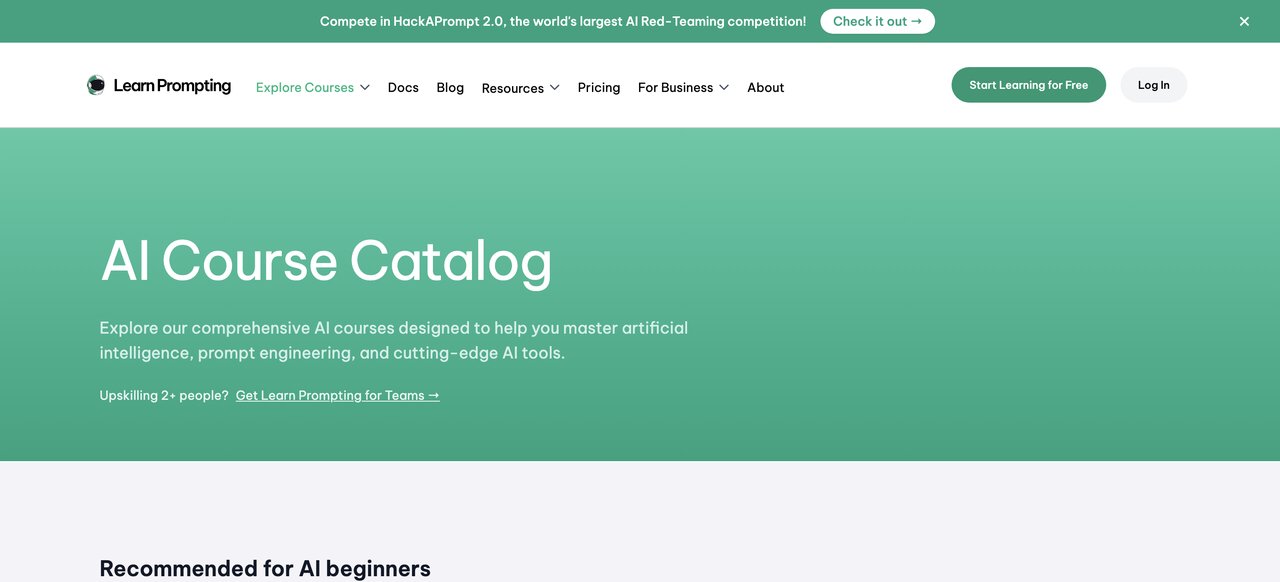
Harvard University's course is targeted at healthcare leaders, covering strategic frameworks for AI implementation, diagnostic applications, and precision medicine. It emphasizes leadership and operational efficiency in digital transformation.
- Key Topics Covered: AI implementation strategies, diagnostic applications, precision medicine.
- Target Audience: Healthcare leaders and decision-makers.
- Pros:
- Focus on leadership and strategy
- Covers operational efficiency and productivity
- Cons:
- Premium pricing
This course is ideal for leaders aiming to integrate AI strategically within their organizations.
Course 12: Artificial Intelligence in Healthcare: Fundamentals and Applications by MIT
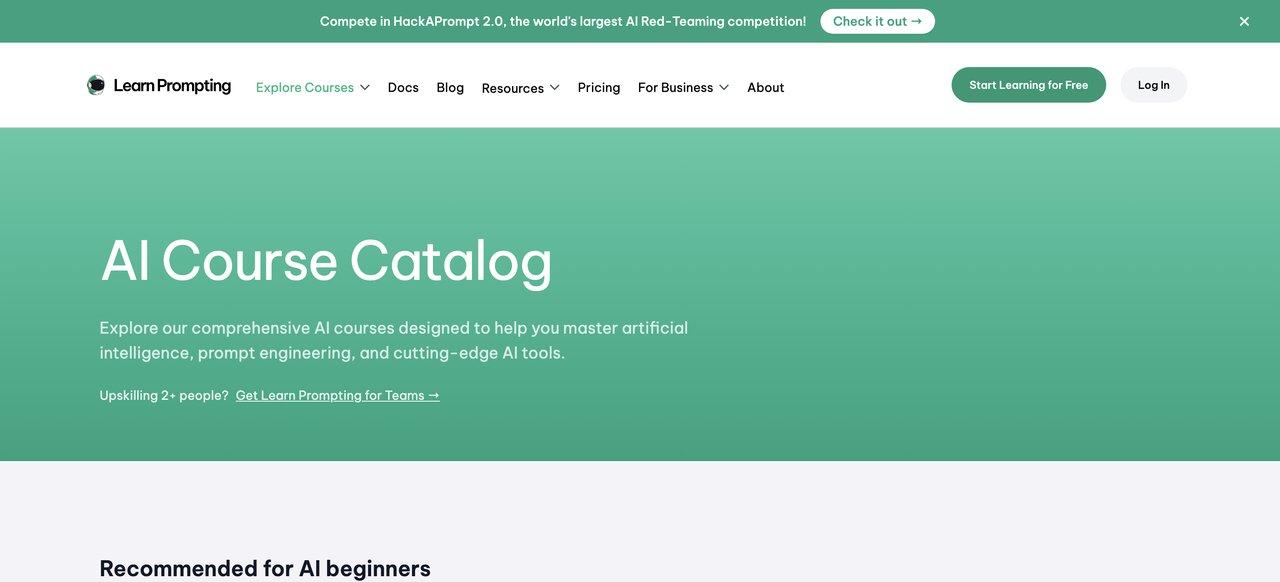
MIT's course focuses on AI decision frameworks, healthcare simulations, and responsible AI development. Designed for professionals interested in shaping future medicine with innovative AI tools.
- Key Topics Covered: AI decision frameworks, healthcare simulations, responsible AI development.
- Target Audience: Healthcare professionals interested in responsible AI development.
- Pros:
- Innovative curriculum
- Emphasis on responsible AI development
- Cons:
- Premium pricing
This course is suitable for professionals focusing on ethical and responsible AI use in healthcare.
Course 13: Artificial Intelligence AI in Healthcare Free Course by Oxford University
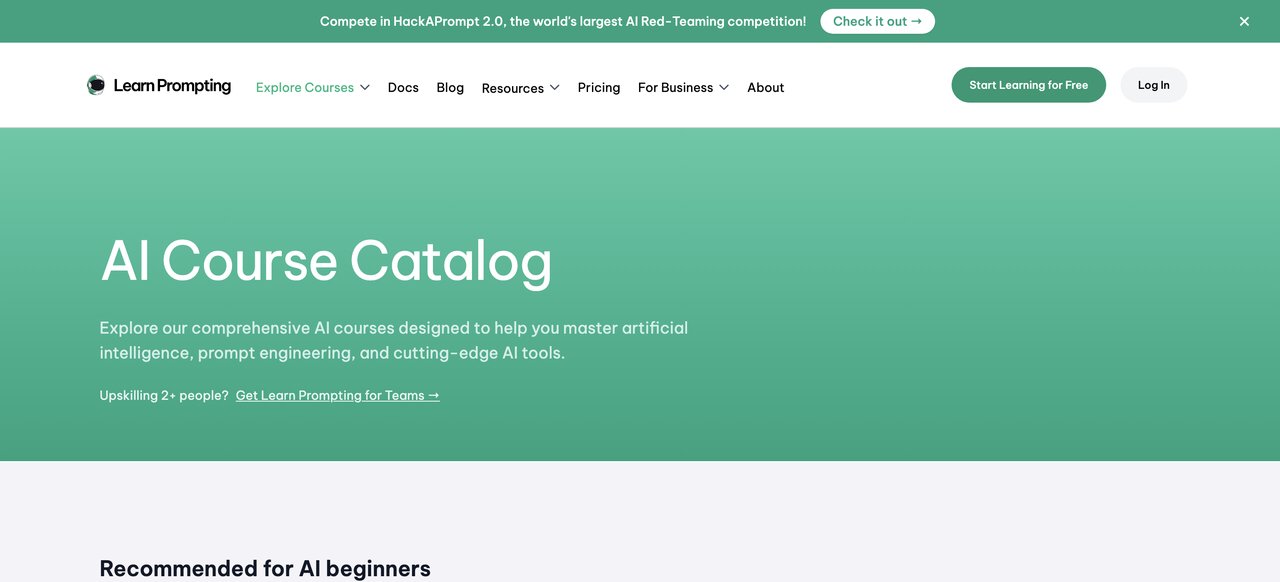
Oxford University's free course provides hands-on practice with AI healthcare tools, ethical frameworks, and a European perspective on AI implementation. It offers small cohort sizes for personalized attention.
- Key Topics Covered: AI healthcare tools, ethical frameworks, European AI perspectives.
- Target Audience: Healthcare professionals seeking free AI training.
- Pros:
- Free
- Hands-on practice
- Personalized attention
- Cons:
This course benefits those wanting personalized and practical AI training without cost.
Course 14: Medmastery ChatGPT Essentials for Clinicians by Medmastery
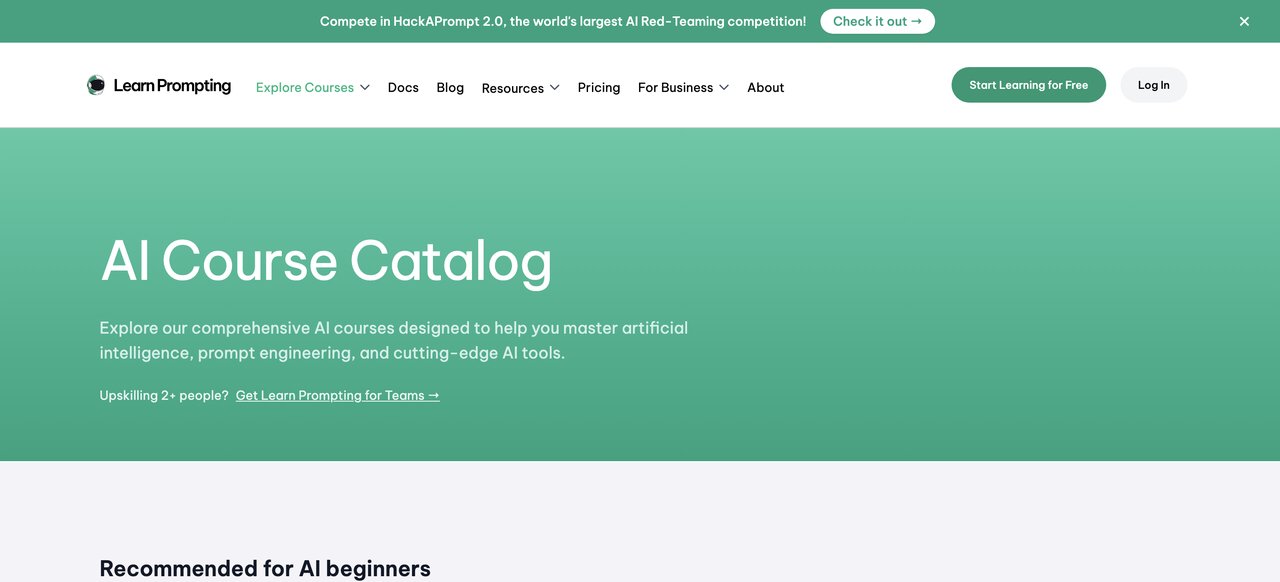
Medmastery's free course is beginner-friendly, focusing on ChatGPT integration in healthcare. It provides 14 short lessons on practical workflow optimization and immediate implementation strategies.
- Key Topics Covered: ChatGPT integration, practical workflow optimization.
- Target Audience: Clinicians new to AI looking for practical, free training.
- Pros:
- Free
- Beginner-friendly
- Practical workflow optimization
- Cons:
This course is ideal for beginners seeking practical AI integration skills in healthcare.
Course 15: University of Illinois AI in Medicine Certificate
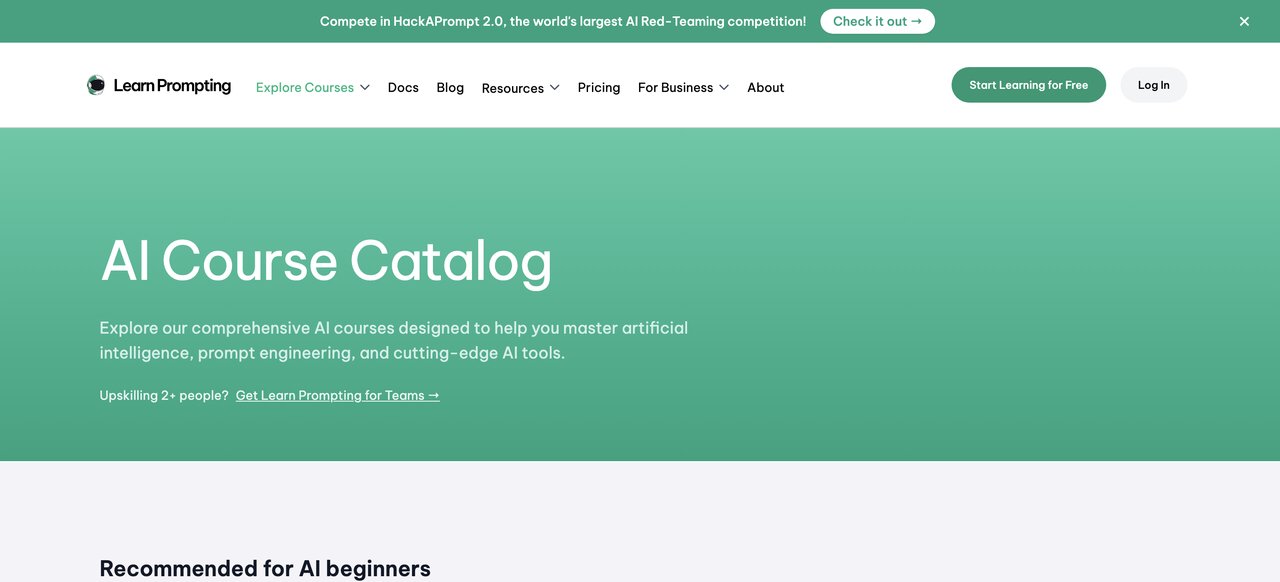
This certificate program by the University of Illinois emphasizes machine learning algorithms, AI software deployment, and technical skill development in medicine. It also offers CE credits for healthcare professionals.
- Key Topics Covered: Machine learning algorithms, AI software deployment, technical skills.
- Target Audience: Healthcare professionals seeking technical AI skills.
- Pros:
- Technical skill development
- CE credits available
- Cons:
This course suits professionals aiming to enhance their technical AI expertise in medicine.
Course 16: Royal College of Surgeons in Ireland: AI in Medical Imaging
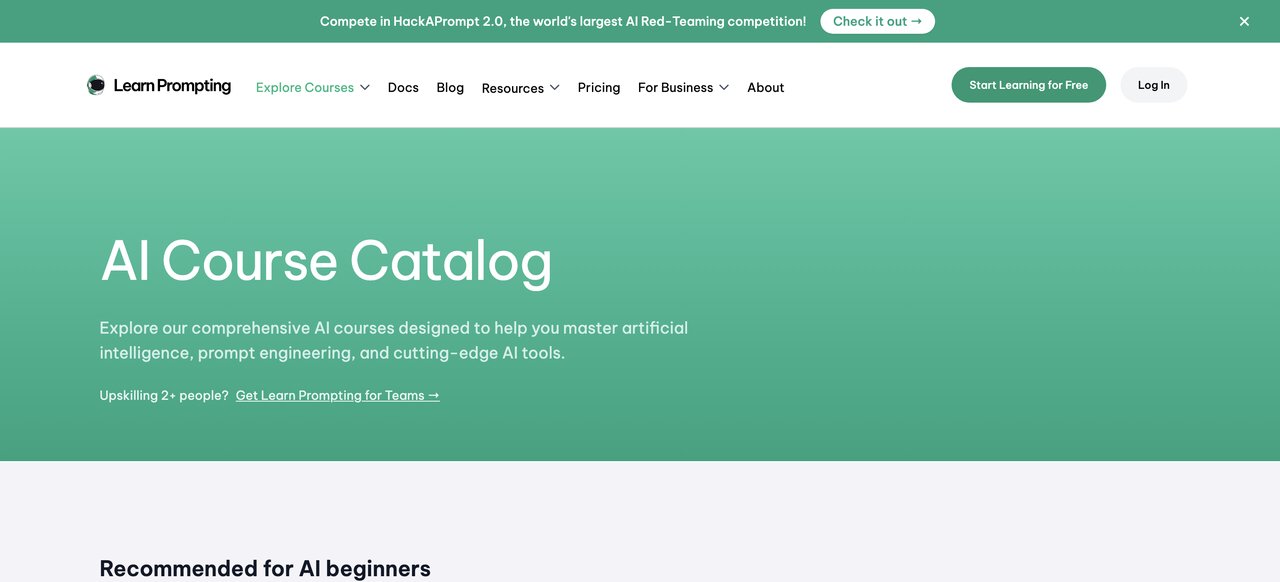
Specialized for imaging specialists, this course covers AI applications in medical imaging, ethical challenges, and clinical validation. It emphasizes integration with imaging workflows.
- Key Topics Covered: AI in medical imaging, ethical challenges, clinical validation.
- Target Audience: Imaging specialists and radiologists.
- Pros:
- Specialized for imaging professionals
- Focus on clinical validation and workflow integration
- Cons:
This course is perfect for imaging professionals wanting to integrate AI into their workflows.
Course 17: University of Central Lancashire: Artificial Intelligence in Healthcare
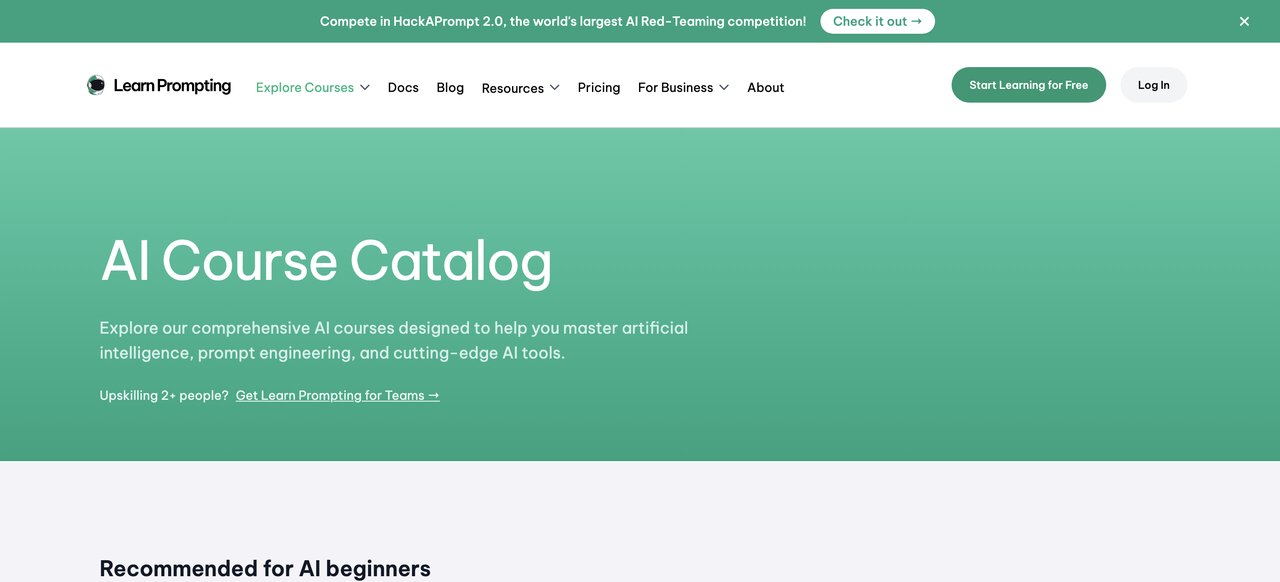
This course addresses AI in clinical decision-making, ethical frameworks, and integration with clinical workflows. It balances technical knowledge with patient-centered care.
- Key Topics Covered: Clinical decision-making, ethical frameworks, patient-centered care.
- Target Audience: Healthcare professionals interested in a patient-centered AI approach.
- Pros:
- Patient-centered approach
- Balances technical and ethical aspects
- Cons:
- Higher cost
This course is suitable for professionals seeking a balanced approach to AI integration.
Course 18: American Academy of Family Physicians: AI in Family Medicine
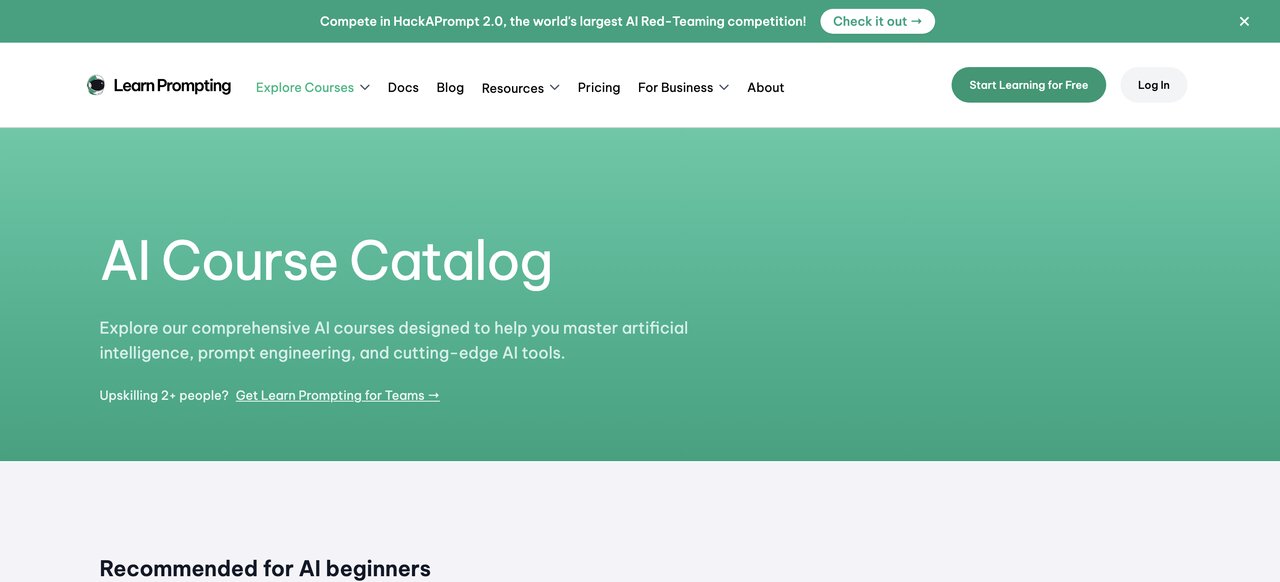
This free course by the American Academy of Family Physicians focuses on AI applications to reduce administrative tasks in family medicine. It helps primary care physicians implement machine learning solutions to improve practice efficiency and patient engagement.
- Key Topics Covered: AI applications in family medicine, practice efficiency, patient engagement.
- Target Audience: Primary care physicians interested in AI integration.
- Pros:
- Free
- Focus on practical implementation for family medicine
- Cons:
This course is ideal for family physicians looking to enhance efficiency with AI tools.
Overall Recommendations
Choosing the right AI course for healthcare professionals depends on the specific needs and goals of the learner. For those seeking a comprehensive, ongoing education with continuous updates, CompleteAI Training provides an extensive range of courses and certifications at an affordable price. Healthcare professionals in Indonesia can benefit from the practical, hands-on training offered by United in Diversity in collaboration with UBC. Stanford and Harvard's premium courses are best suited for those in leadership roles or seeking advanced, strategic AI knowledge.
Free courses from Oxford University and Medmastery offer accessible options for beginners, while specialized courses such as those from the Royal College of Surgeons in Ireland cater to specific professional needs. Ultimately, the ideal course should align with the learner's career objectives, budget, and preferred learning style.




